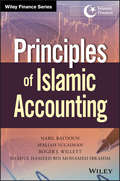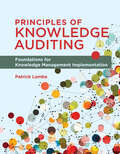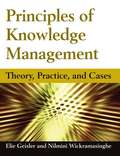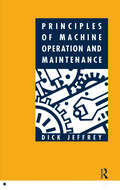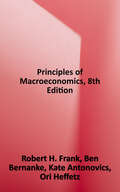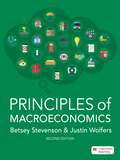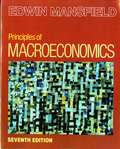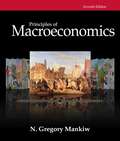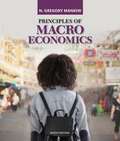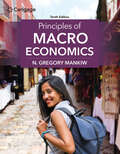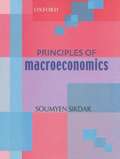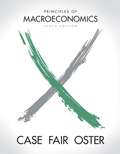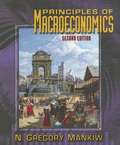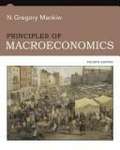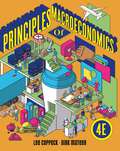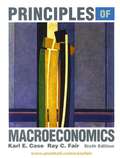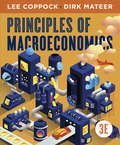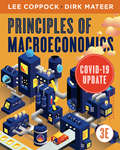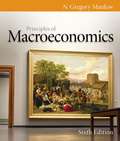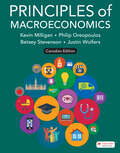- Table View
- List View
Principles of Integrated Marketing Communications
by Lawrence AngPrinciples of Integrated Marketing Communications: A Focus on New Technologies and Advanced Theories explains the principles and practice of implementing an effective marketing strategy using a variety of channels and techniques, such as brand equity, advertising and personal selling. It equips students with the knowledge to develop sophisticated marketing campaigns for contemporary business environments. Designed to introduce students to IMC in an engaging way, this valuable resource covers the latest concepts and tools in marketing and communications - from theories of social influence to the growing use of social media. Each chapter contains a 'Further thinking' section, giving students the opportunity to extend their understanding of the conceptual and historical underpinnings of IMC and teaching them how to analyse and overcome problems when devising an IMC strategy. Each chapter also includes learning objectives and review questions, to reinforce knowledge. Extensive additional material - including extra case studies and topical multimedia files - is available on the companion website.
Principles of Integrated Marketing Communications: An Evidence-based Approach
by Lawrence AngMarketing in the digital age poses major challenges for traditional and established practices of communication. To help readers meet these challenges Principles of Integrated Marketing Communications: An Evidence-based Approach provides a comprehensive foundation to the principles and practices of integrated marketing communications (IMC). It examines a variety of traditional and digital channels used by professionals to create wide-reaching and effective campaigns that are adapted for the aims of their organisations. This edition has been thoroughly revised and each chapter includes: case studies of significant and award-winning campaigns from both Australian and international brands that illustrate the application of explored concepts; discussion and case study questions that enable readers to critically evaluate concepts and campaigns; a managerial application section that illustrates how concepts can be applied effectively in a real situation; a 'further thinking' section that expands knowledge of advanced concepts and challenges readers to think more broadly about IMC.
Principles of International Finance (Routledge Library Editions: International Finance #3)
by Daniel R. KanePrinciples of International Finance, first published in 1988, provides a comprehensive introduction to international finance which is rapidly becoming an increasingly important branch of international economics. The book is structured so that it can easily be adopted as a complete one-semester course in international finance and is divided into the four major divisions of international finance: The Foreign Exchange Market and the Balance of Payments; Exchange Rate Systems; Equilibrium and the Adjustment Process and The Post-War International Financial System. This book is designed for economics and business undergraduates studying international finance for the first time. It is non-mathematical and presumes no more than a general background in macroeconomics.
Principles of Islamic Accounting (Wiley Finance)
by Roger Willett Nabil Baydoun Maliah Sulaiman Shahul IbrahimYour introduction to Islamic accounting Principles of Islamic Accounting is the first and only text that covers the fundamentals of Islamic accounting in English. A comprehensive guide, this groundbreaking reference offers both insight into Islamic accounting best practices and disclosure for Shariah-compliant instruments. Covering everything from basic transaction analysis to the preparation of financial statements, this reference serves as a broad framework around which undergraduate students can build their understanding of the Islamic business environment by offering context and showcasing how Islamic values can influence the disclosure of financial information. Islamic accounting is becoming an increasingly important aspect of the business field as globalization results in a surge in business partnerships and transactions around the world. Today's students need to understand Islamic accounting principles in order to effectively work with professionals who adhere to these standards—and accessing this information via text in English was not possible until this revolutionary reference. Review the basics through an introduction to Islamic accounting Understand the recording process, and how to complete the accounting cycle and adjust accounts as necessary Explore accounting for assets, liabilities, equity, and sukuk, as well as zakat and takaful accounting Discover details regarding Islamic commercial law, accounting for Islamic financial institutions, and Islamic corporate governance and sustainability, and look at auditing from an Islamic perspective Principles of Islamic Accounting is an essential text for first-year university students who are studying Islamic accounting, as well as professional societies and organizations that support the use of Islamic accounting principles, such as The Islamic Finance Professionals Association.
Principles of Knowledge Auditing: Foundations for Knowledge Management Implementation
by Patrick LambeA comprehensive theoretical and practical guide to the operating principles of knowledge auditing, illustrated with numerous case studies.A knowledge audit provides an &“at a glance&” view of an organization's needs and opportunities. Its purpose is to improve an organization's effectiveness through a better understanding of the dynamics and levers of knowledge production, access, and use. However, this developing field is hampered by the lack of a common language about the origins and nature of knowledge auditing. In Principles of Knowledge Auditing, Patrick Lambe integrates the theory and practices of the field, laying out principles and guidelines for a clearer and more pragmatic approach to knowledge auditing that makes it more accessible to practitioners and researchers.Lambe examines knowledge auditing in the context of the development of communications, information, and knowledge management in the twentieth century. He critiques and clarifies ambiguities in how knowledge audits are approached and described, as well as how the results are conveyed within organizations. He discusses the benefits and risks of knowledge management standards. Knowledge auditors, he says, need a common frame of reference more than they need standards. Standards have their uses, but they provide only markers and sign posts and are poor representations of the richness of the landscape. He concludes with a set of guiding principles for practitioners.
Principles of Knowledge Management: Theory, Practice, and Cases
by Nilmini Wickramasinghe Eliezer GeislerThis text provides a comprehensive introduction to the new field of knowledge management. It approaches the subject from a management rather than a highly technical point of view, and provides students with a state-of-the-art survey of KM and its implementation in diverse organizations. The text covers the nature of knowledge (tacit and explicit), the origins and units of organizational knowledge, and the evolution of knowledge management in contemporary society. It explores the implementation and utilization of knowledge management systems, and how to measure their impact, outputs, and benefits. The book includes a variety of original case studies that illustrate specific situations in which the absence or existence of knowledge management systems has been crucial to the organization's actions. Charts and figures throughout help clarify more complex phenomena and classifications, and each chapter includes review questions and a comprehensive index.
Principles of Machine Operation and Maintenance
by Dick JeffreyThis book explains how rotating machinery works, and the role of the maintenance engineer in ensuring its proper operation. Stress is laid on the need for the trainee engineer to develop skills in diagnosis and troubleshooting as well as practicalexpertise in maintenance procedures.
Principles of Macroeconomics
by Robert H. Frank Ben Bernanke Kate Antonovics Ori HeffetzPrinciples of Macroeconomics focuses on seven core principles to produce economic naturalists through active learning. By eliminating overwhelming detail and focusing on core principles, students from all backgrounds are able to gain a deeper understanding of economics. Focused on helping students become "economic naturalists," people who employ basic economic principles to understand and explain what they observe in the world around them. COVID-19 pandemic content, analysis, and examples further engage students. <p><p> With engaging questions, explanations, exercises and videos, the authors help students relate economic principles to a host of everyday experiences such as going to the ATM or purchasing airline tickets. Throughout this process, the authors encourage students to become "economic naturalists." Author developed Learning Glass concept overview videos and Worked Problem videos give students an overview of challenging and important concepts. <p><p> With new videos and engagement tools in Connect, like Application-Based Activities, alongside SmartBook's adaptive reading experience, the 8th edition enables instructors to spend class time engaging, facilitating, and answering questions instead of lecturing on the basics.
Principles of Macroeconomics
by Betsey Stevenson Justin WolfersStevenson/Wolfers is built around the idea that ‘every decision is an economic decision’. It is the perfect choice for Principles of Economics courses and for economics majors and nonmajors alike.
Principles of Macroeconomics
by Edwin MansfieldStudents will appreciate the accompanying Study Guide, prepared by Professor Mansfield himself. It contains Chapter Profiles, behavioral Objectives, Case Studies, Objective Questions, Discussion Questions, and Problems for each chapter in the textbook. A separate Computerized Study Guide with approximately 200 review questions and diagrams is also available.
Principles of Macroeconomics
by N. Gregory MankiwWith its clear and engaging writing style, PRINCIPLES OF MACROECONOMICS, Seventh Edition, continues to be one of the most popular books on economics available today. Mankiw emphasizes material that you are likely to find interesting about the economy (particularly if you are studying economics for the first time), including real-life scenarios, useful facts, and the many ways economic concepts play a role in the decisions you make every day.
Principles of Macroeconomics
by N. Gregory MankiwEconomics is fundamentally about understanding the world in which we live. Most chapters of this book include Case Studies illustrating how the principles of economics can be applied. In addition, In the News boxes offer excerpts from newspapers, magazines, and online news sources showing how economic ideas shed light on current issues facing society. After students finish their first course in economics, they should think about news stories from a new perspective and with greater insight.
Principles of Macroeconomics
by N. Gregory MankiwGain a strong foundation in macroeconomics with today's most popular economics text, trusted by students worldwide -- Mankiw's PRINCIPLES OF MACROECONOMICS, 10E. Using a clear, inviting writing style, this edition focuses exclusively on content to help you better understand the world and economy in which you live. You become a more astute participant in today's economic environment as you learn the potential and limits of economic policy. The latest examples and learning features bring macroeconomic principles to life as author Gregory Mankiw puts himself in the position of someone seeing economics for the first time. Dr. Mankiw's goal is to emphasize the material you will find most relevant and interesting as you study macroeconomics. MindTap digital resources, Aplia digital homework solution and author videos are also available to help you further master key macroeconomic principles.
Principles of Macroeconomics
by OpenStaxPrinciples of Macroeconomics covers the scope and sequence for a one-semester economics course. The text also includes many current examples, including: the housing bubble and housing crisis, Zimbabwe’s hyperinflation, global unemployment, and the appointment of the United States’ first female Federal Reserve chair, Janet Yellen. The pedagogical choices, chapter arrangements, and learning objective fulfillment were developed and vetted with feedback from educators dedicated to the project. The outcome is a balanced approach to economics, to both Keynesian and classical views, and to the theory and application of economics concepts. Current events are treated in a politically-balanced way, as well.
Principles of Macroeconomics
by Soumyen SikdarThis textbook introduces macroeconomics to students of economics and management who have limited exposure to the subject. It is a lucid and concise exposition of basic economic theory aided by numerical examples and simple diagrams.
Principles of Macroeconomics (10th Edition)
by Ray C. Fair Karl E. Case Sharon M. OsterThis textbook contains five parts dealing with Introduction to Economics, Concepts and Problems in Macroeconomics, The Core of Macroeconomic Theory, Further Macroeconomics Issues, and The World Economy.
Principles of Macroeconomics (2nd Edition)
by N. Gregory MankiwIn writing this textbook, Mankiw has tried to put himself in the position of someone seeing economics for the first time. The author's conversational writing style is superb for presenting the politics and science of economic theories to tomorrow's decision-makers. Because Mankiw wrote it for the students, the book stands out among all other principle texts by intriguing students to apply an economic way of thinking in their daily lives. Receiving such praise as "perhaps the best ever" textbook in economic principles, it's no wonder Mankiw's prize project has quickly become one of the most successful books ever to be published in the college marketplace.
Principles of Macroeconomics (4th edition)
by N. Gregory MankiwIn the fourth edition of this book, more is devoted to applications and less to formal economic theory. Most chapters include case studies illustrating how the principles of economics are applied. "In The News" boxes offer excerpts from newspaper articles showing how economic ideas shed light on current issues facing society.
Principles of Macroeconomics (Eleventh Edition)
by Ray C. Fair Karl E. Case Sharon OsterCollege economics textbook.
Principles of Macroeconomics (Fourth Edition)
by Dirk Mateer Lee CoppockMateer and Coppock Make Economics for Everyone Drawing on their extensive teaching experience in the classroom and online, Mateer and Coppock continuously innovate to address the changing teaching and learning challenges faced by instructors and students. The Fourth Edition introduces new scaffolded learning pedagogy with a Norton Illumine Ebook as well as revised InQuizitive and Smartwork activities that provide personalized support and build problem-solving skills. New relevant and relatable examples ensure that students understand how their lives are influenced by economics, and rich Norton Teaching Tools resources help instructors connect with students before, during, and after class. This purchase offers access to the digital ebook only.
Principles of Macroeconomics (Sixth Edition)
by Ray C. Fair Karl E. CasePerhaps the greatest change in the past three years has been the dramatic emergence of the technology-based "new economy."
Principles of Macroeconomics (Third Edition)
by Dirk Mateer Lee CoppockRelatable economics is memorable economics Widely praised by adopters as the most relatable textbook available, Mateer and Coppock’s Third Edition of Principles of Economics develops students’ problem-solving skills with step-by step explanations and familiar applications and examples. Principles of Economics makes economics memorable for an exam and a lifetime. This purchase offers access to the digital ebook only.
Principles of Macroeconomics (Third Edition): Covid-19 Update
by Dirk Mateer Lee CoppockHelping you explain a different world Students and instructors are living through a pandemic that has changed how and what they teach, and how and where they learn. The COVID-19 Update of Principles of Economics, Third Edition, provides the information that students need to make sense of the impacts COVID-19 has had on the economy. The Update Edition has been completely revised to include new examples, new data, new policies, and more. All of Norton’s digital resources fully integrate with most learning management systems, providing the flexibility instructors need in this changed world. This purchase offers access to the digital ebook only.
Principles of Macroeconomics 6th Edition
by N. Gregory MankiwPRINCIPLES OF MACROECONOMICS, Sixth Edition, became a best seller after its introduction and continues to be the most popular and widely used text in the economics classroom. Instructors found it the perfect complement to their teaching. A text by a superb writer and economist that stressed the most important concepts without overwhelming students with an excess of detail was a formula that was quickly imitated, but has yet to be matched. The sixth edition features a strong revision of content in all twenty-three chapters. Dozens of new applications emphasize the real-world relevance of economics for today's students through interesting news articles, realistic case studies, and engaging problems.
Principles of Macroeconomics Canadian Edition
by Betsey Stevenson Justin Wolfers Kevin Milligan Philip OreopoulosPrinciples is built around the idea that “every decision is an economic decision.” It is the perfect choice for Canadian principles of economics courses and for economics majors and nonmajors alike.



